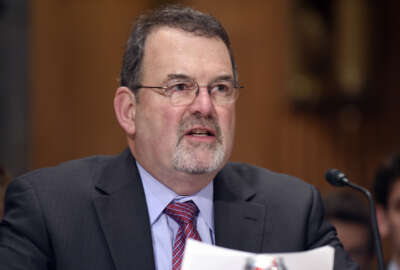
OMB’s Mader confident to get 2016 budget deal by Dec. 11
Dave Mader, the acting deputy director for management and controller at OMB, said negotiations with Congress are going well to get agencies funded before the...
A senior Office of Management and Budget official is confident the Congress and administration will come together on a budget for fiscal 2016 by Dec. 11.
Dave Mader, the acting deputy director for management and controller at OMB, said Nov. 18 that with about a month before the current continuing resolution expires, the ongoing conversations with House and Senate leaders are making solid progress, and there is a feeling that no one wants another shutdown.
“I think we are making good progress. The fact that the administration and Congress reached an agreement that covers both 2015 and 2017, I think, has been good news for all of us,” Mader said in a speech Wednesday at the Vision 2015 conference sponsored by the Professional Services Council in Falls Church, Virginia. “The challenge that we all face now is how do we take these top level numbers, which are much better than what we were dealing with before the budget deal, and drive them through the appropriations process? Clearly, working with both House and Senate, majority and minority, to get those appropriation bills in a place where the President can sign them before Dec. 11 is one of our utmost priorities.”
President Barack Obama on Nov. 2 signed the Bipartisan Budget Control Act of 2015 . The law eases strict caps on spending by providing an additional $80 billion, split evenly between military and domestic programs.
Sen. Mark Warner (D-Va.) said at the Vision conference that Congress had a “burst of sanity” when it passed the two-year budget deal.
Mader said having the two-year agreement will help the administration continue to focus on several priorities over the next 14 months, including job training, investing in education and national security.
“The deal is paid for in a very responsible, balanced way by locking in two years of funding, and it should break the cycle that you have been part of, of potential shutdowns and manufactured crises,” he said. “I think all of you know all too well the impact that has on the private sector. It’s not just an impact on the government. Shutting down the government has a ripple affect across this country.”
Mader emphasized a lot of work remains before Dec. 11 to pass a budget deal.
“We can’t allow ourselves to be sidetracked by ideological provisions that have no bearing on how to fund the government for the balance of 2016 and going into 2017,” he said.
Warner also expressed concern over possible controversial provisions that could derail further negotiations.
Warner said while the government is heading toward an omnibus deal, it’s “not out of the woods on a Dec. 11 shutdown.”
Cybersecurity and workforce are top priorities
Part of the current and 2017 budget negotiations with Congress will be a big focus on cybersecurity.
Mader said cybersecurity and workforce are the administration’s top two management priorities.
“The focus on cyber gets reflected clearly in our budget priorities,” he said. “The negotiations that are ongoing with the Congress in 2016 clearly have a cyber bent to them because we know we have vulnerabilities now, we know what we are faced with in the way of investments, so we are actively engaged with the appropriators in conversations around additional funding being directed around critical infrastructure and critical systems across the government.”
Mader didn’t offer more specifics on which investments or where, whether Defense Department or civilian.
“What the cyber sprint reinforced was we’ve been patching up legacy systems for literally decades, and all of a sudden, now we realize it’s hard to get young computer scientists out of school and train them on COBOL. They are not really cool about learning COBOL, and we have more COBOL systems running government than you could imagine,” he said. “We knew we had the legacy problem. We knew we had to replace it. We knew that eventually these systems would just fail. I think the cyber incident heightened the sensitivity that those systems were designed 20-30 years ago in a different world that didn’t have the same kinds of threats that we have today.”
Mader said the emphasis is on prioritizing the most critical systems, and then how do OMB and agencies obtain the people and money to make improvements.
Along with improving the cybersecurity of systems, Mader said the budget also will focus on bringing the people in to do the work of securing systems and data. The Homeland Security Department recently received permission from OPM to hire 1,000 people into cyber jobs.
“One of the issues that came out of the 30-day study and is clearly evident in the cybersecurity implementation strategy is the human capital challenges,” he said. “What you will be seeing from us over the next couple of months is a doubling down on hiring, retaining and training cybersecurity employees in DHS and elsewhere across the government. Clearly we can’t hire enough so there will need to be a continued involvement from industry as we walk through department by department and assess what needs to be done and changed over the next several years.”
Mader said the Office of Personnel Management has plans to refocus efforts to improve the federal hiring process.
“Are there long-term legislative fixes that need to happen? I believe yes. I think everybody would say we need to fix some things legislative. The fact is that isn’t going to get done in 14 months,” he said. “What we can get done is take the authorities that we have today and better using them. We’ve demonstrated we could do that. What has happened over time is all of these myths have grown up in the community about ‘I can’t do this and I can’t do that.’ Well, the fact of the matter is a lot of that is myth and you can do it. I will not say it’s easy, but you can get it done.”
Copyright © 2025 Federal News Network. All rights reserved. This website is not intended for users located within the European Economic Area.
Jason Miller is executive editor of Federal News Network and directs news coverage on the people, policy and programs of the federal government.
Follow @jmillerWFED
Related Stories





